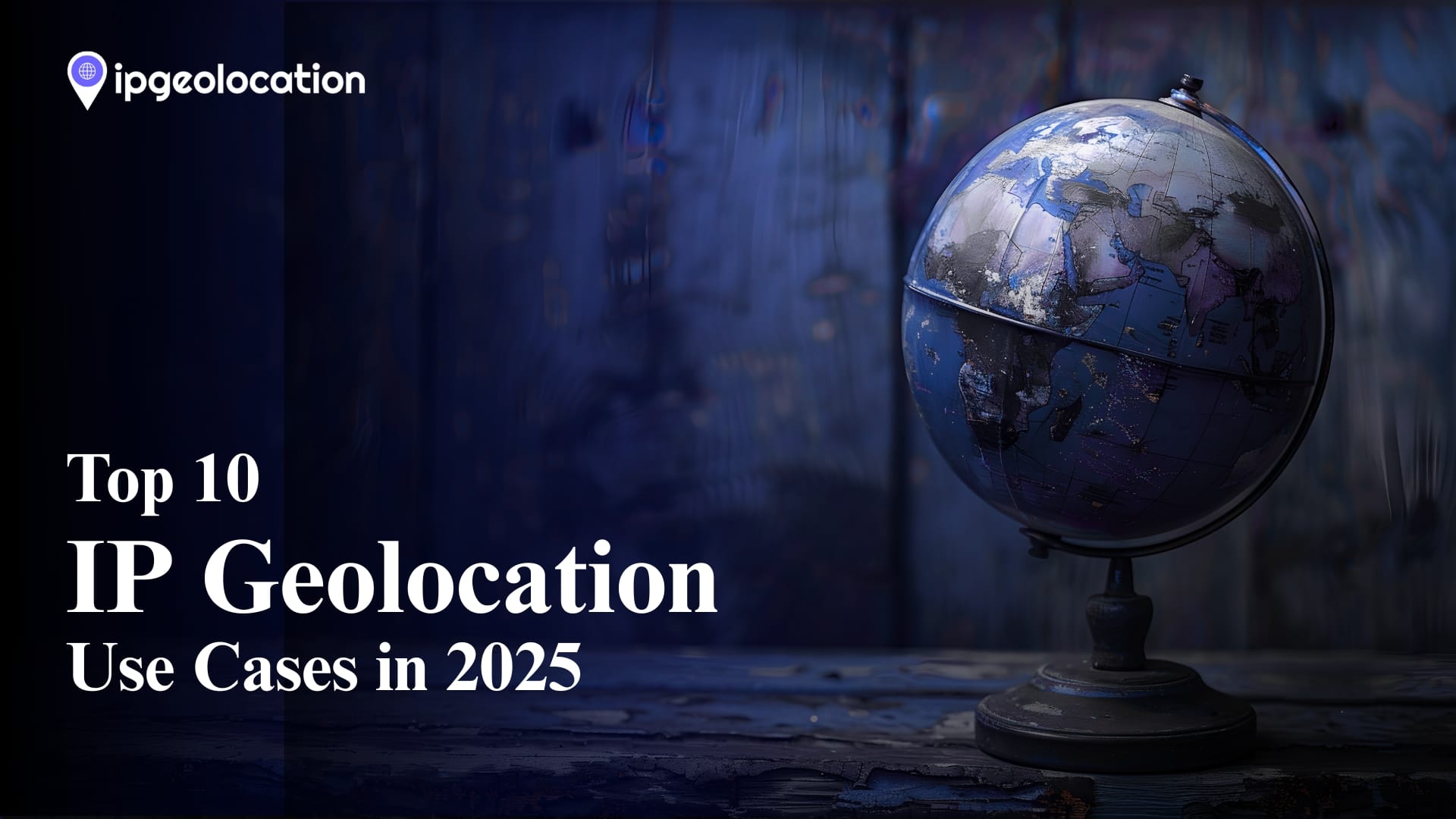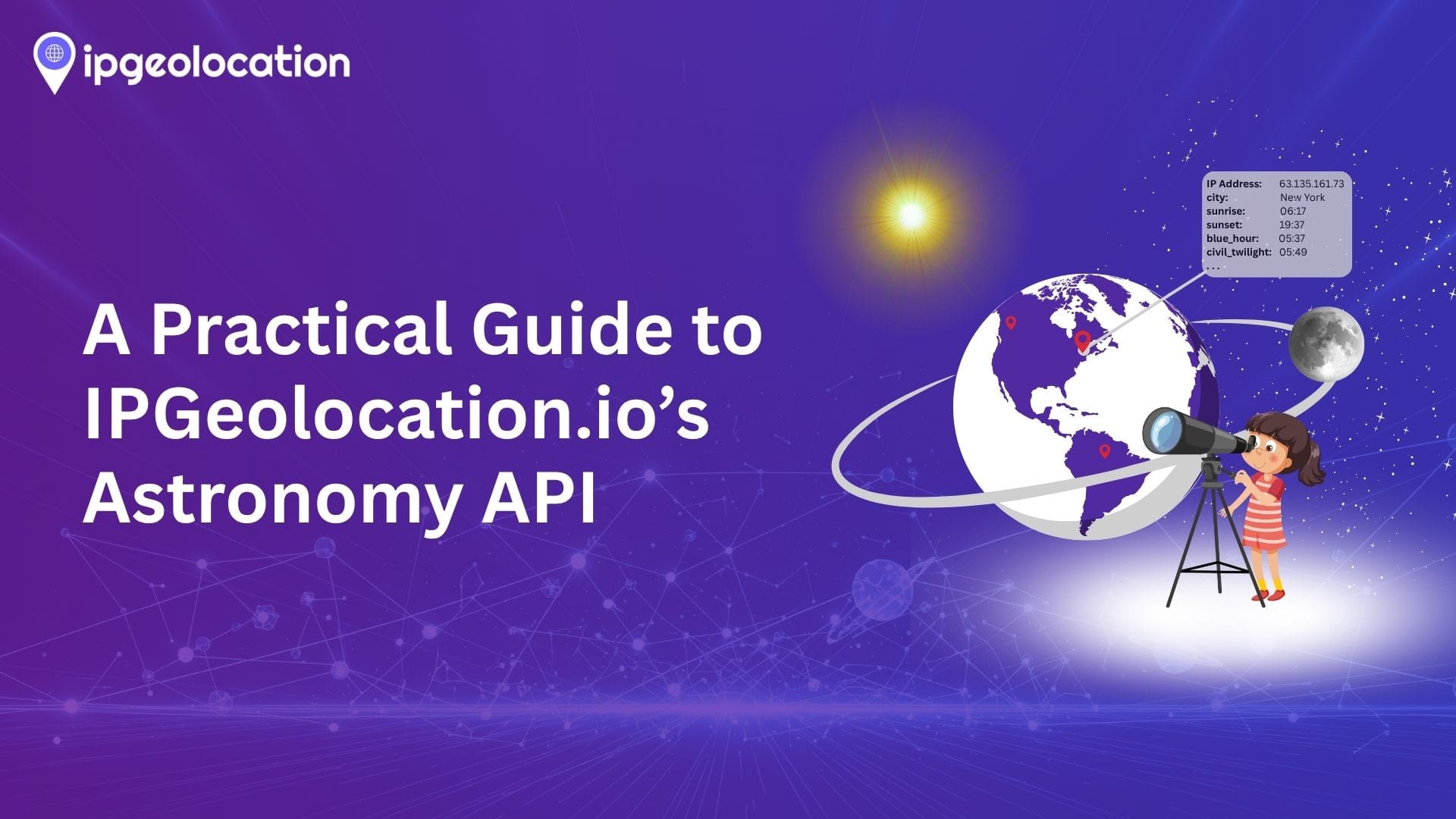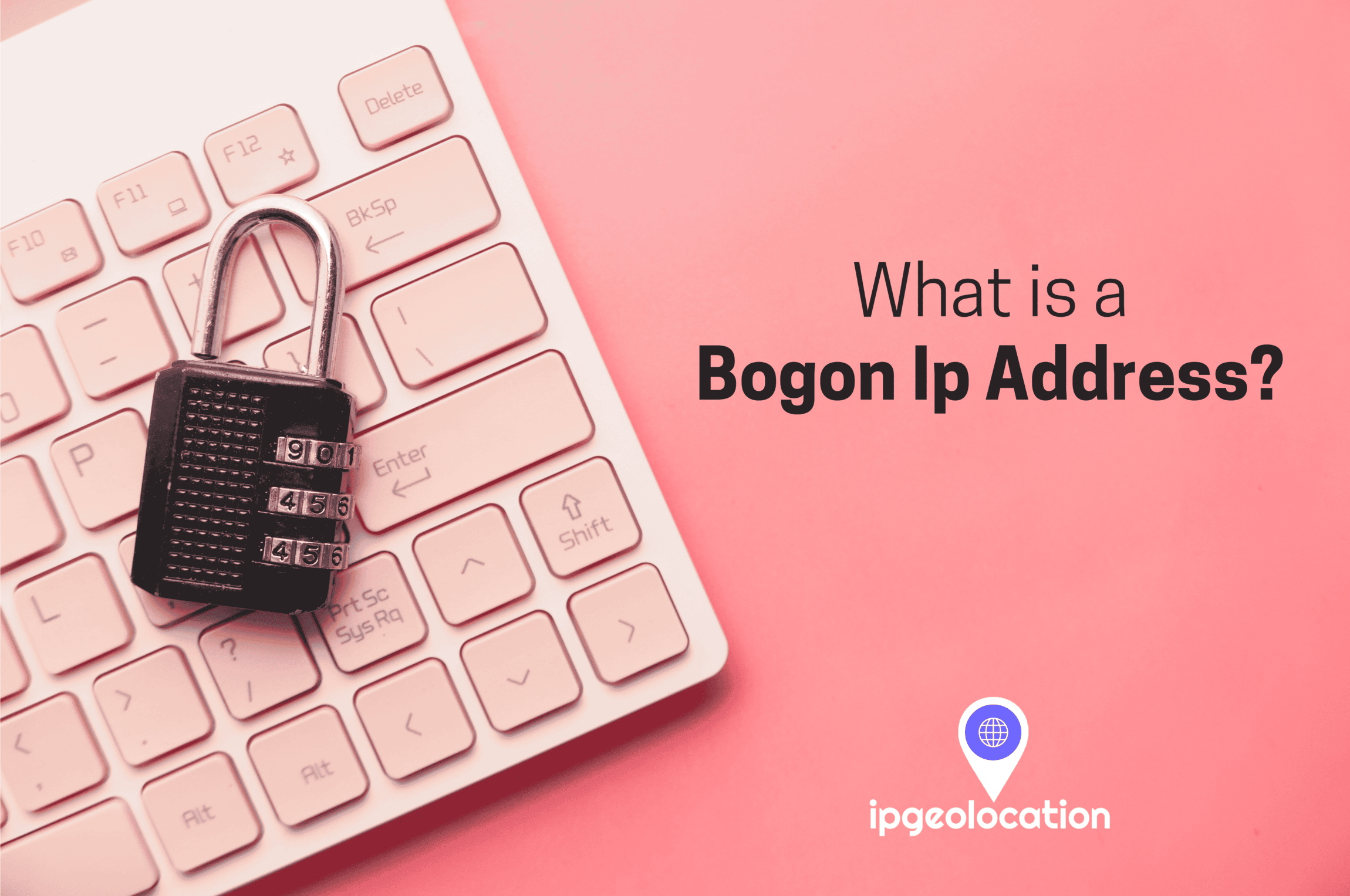Table of Contents
Not long ago, IP geolocation was a backstage tool — something only network engineers and security pros cared about. Now, in 2025, it’s everywhere. It helps you discover shows you’ll actually watch, makes checkout feel seamless, and steps in fast when things look sketchy. A login from across the globe ? A strange purchase in the middle of the night ? It’s flagged and frozen before you even notice. It’s not something you think about every day, but it’s always working in the background to make life a little easier and a lot more secure. Even that anonymous stranger poking around your account ? It knows where they are.
In this post, we’ll explore 10 real-world use cases that show how modern teams are using IP geolocation to solve real problems. And we’ll highlight how ipgeolocation.io makes this easy with tools like their APIs and Databases — offering both accuracy and developer-friendly integration.
1 - Content Localization & Regional Personalization
A common but powerful use of IP geolocation is website content localization — adjusting your website or app automatically based on where a user is visiting from. Instead of asking people to choose their language, currency, or region, everything just loads the way it should. This creates a "just for You" experience that boosts engagement and conversion rates. This kind of seamless, automated experience can make a huge difference in how users interact with your site.
In fact, data from IPGeolocation.io suggests that regional customization can boost conversion rates by up to 70%, and just showing prices in someone's local currency could increase conversions by up to 50%. It’s something most of us have experienced without even thinking about it, like seeing local headlines on a news site, opening a weather app and getting your city’s forecast right away, or being redirected to the UK version of a store if you're browsing from London.
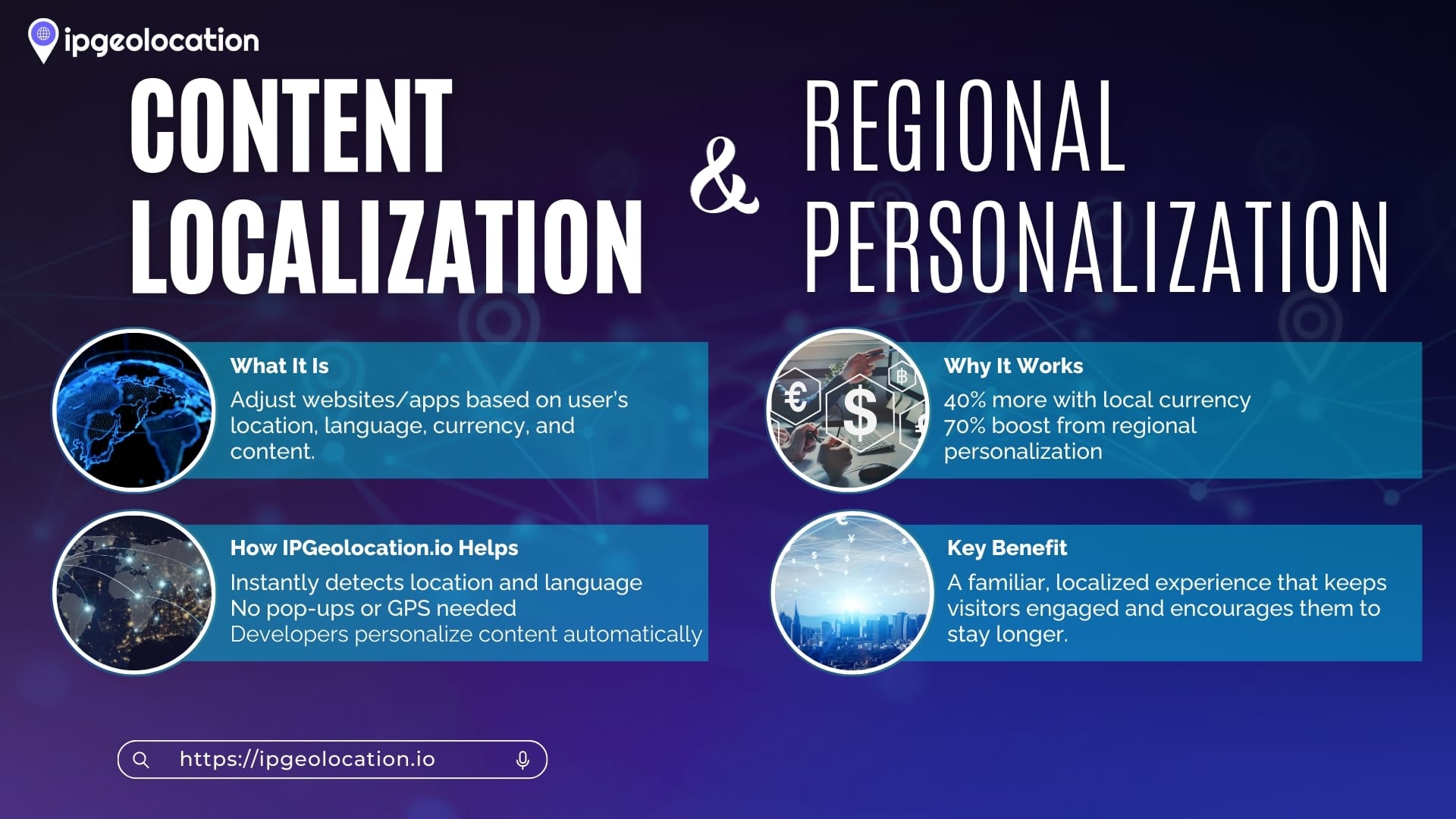
IPGeolocation.io’s API makes this easy by returning detailed ip geolocation data (country, state, city, currency, language and more) for any IP in milliseconds. Developers can use the IP Geolocation API to detect a visitor's locale and serve region-specific pages or personalize content blocks. The key benefit is non-intrusive geolocation, so no need to prompt the user for their location or rely on GPS permission . For example, instead of showing a pop-up asking "Select your country/language," a website can instantly greet the user in their own language with local content. This auto location-detect feature improves user experience and avoids friction.
Ultimately, IP-based content localization helps create a smoother, more personalized experience that ensures visitors feel at home, which translates into longer visits and higher engagement. It’s a must-have for any business with a global audience.
Use the IP Geolocation API for real-time content localization. It provides country, city, languages, currency, and even a country flag icon for a given IP – everything needed to customize the site on the fly. (For bulk or offline use, the IP Geolocation Database offers the same rich location data for your own servers.)
2 - E-commerce Personalization & Price Optimization
IPGeolocation is a game-changer in providing a personalized shopping experience for e-commerce companies. By detecting a shopper’s location, online retailers can do things like: automatically select the local currency and language, pre-fill country in checkout forms, display region-specific product availability, and even adjust pricing or promotions they are offering to specific regions. Amazon famously uses geolocation to streamline shopping. When you visit Amazon, it quietly figures out where you're browsing from through your IP and helps tailor your shopping experience. It might send you to your country’s version of the site, or let you know if something can’t be delivered to your area. It also shows prices in your local currency by default and surfaces deals relevant to your region. These little touches prevent frustration (like learning at checkout that an item can’t be delivered to you) and build trust. Global studies back this up: 76% of online buyers prefer to see prices in their local currency, which helps them make purchase decisions faster. By reducing confusion over currency or shipping, geolocation-driven personalization directly boosts conversion rates and sales.
Smart retailers go beyond convenience when using IP data—they use it to deliver fairer, more personalized pricing experiences. A SaaS provider, for example, might adjust prices to match a customer’s local currency, include the correct VAT automatically, or even highlight region-specific discounts. When businesses take into account what customers can afford and follow tax rules, they stay out of trouble while maximizing customer trust and sales. This strategy, known as price optimization, has quickly become one of the most powerful applications of geo-IP data today.
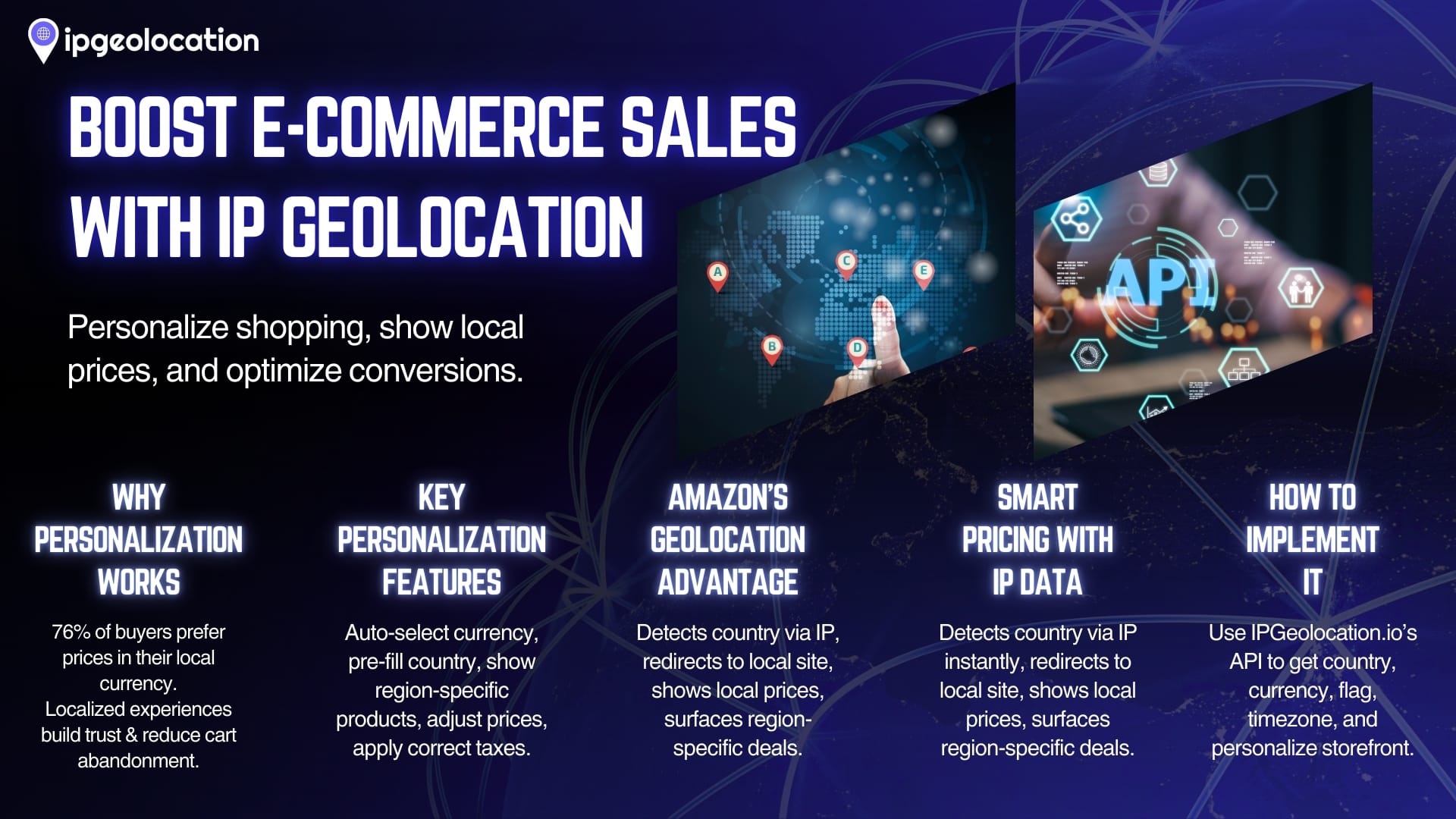
IPGeolocation.io supports e-commerce use cases through both its API and database. The IP Geolocation API provides not just location, but also the local currency code and symbol for the visitor’s country – so you can easily display prices as USD, EUR, JPY, etc. You can even pick up little details like a visitor’s country code and flag, which many sites use to automatically adjust things like contact info or visuals. And if speed really matters - like on a high-traffic online store - you can run the IP Geolocation Database on your own servers for instant lookups. Either way, the idea is simple: when people see prices in their own currency and content that feels familiar, your site feels like it was made for them. That comfort makes it a lot more likely they’ll click "buy."
E-commerce teams can rely on IPGeolocation’s API to add personalized touches based on location in real time – for example, using the currency field and country_name from the response to localize the store to match the visitor’s location. The API’s high accuracy and global coverage ensure that even if your shopper is in a less common locale, you’ll get reliable data (country code, currency, etc.) gives you the info you need to make their visit feel more familiar. Don’t forget to use the Timezone API as well for showing local delivery estimates or store hours in the user’s timezone.
3 - Location-Based Advertising & Marketing
In the world of digital marketing, location is king when it comes to relevance. , enables location-based advertising – serving ads or marketing messages targeted to users in specific regions, which dramatically improves click-through and conversion rates. Major ad platforms like Google Ads and Facebook Ads rely heavily on precise location data to let advertisers refine who sees their campaigns by country, city, or even radius from a point on the map. The reason is simple: an ad that references the viewer’s locale feels more relevant and is far more likely to engage. For example, a food delivery service could run a Facebook ad saying "Hot pizza in Paris – delivered in 30 minutes" and ensure it only shows to users actually in Paris. This outperforms generic ads by a wide margin. In fact, about 67% of marketers say location data provides more precise ad targeting, and case studies have shown that using geolocation smartly can improve ad campaign conversion rates by up to 5X (500%). Those are massive gains in ROI achieved simply by including location filters.
Beyond ads, marketers use IP intelligence for localized email campaigns, personalization of landing pages, and segmentation of users by region for analytics. Even content marketing can be geo-tailored – e.g., sending different newsletters to users in different cities with references to local events or using IP-based location to personalize website banners ("Hello from [City]! Check out our services in your area.").
straightforward offers tools that make geo-location based marketing straight forward and easy to use. The IP Geolocation API provides real-time location lookup that can feed into ad decisioning systems or A/B testing frameworks. For instance, you could call the API on page load to decide which regional promotion banner to show. Another helpful product is the IP to Company API/Database, which can enrich IP data with the visitor’s company or ISP (internet service provider) – valuable for account-based marketing (more on that below) or distinguishing residential vs. corporate traffic for marketing analytics. By combining geolocation with other signals, marketers can get a rich profile of an incoming visitor. The tone here is subtle but powerful: users end up seeing marketing content that "speaks their language" – literally and figuratively – making them more likely to convert.
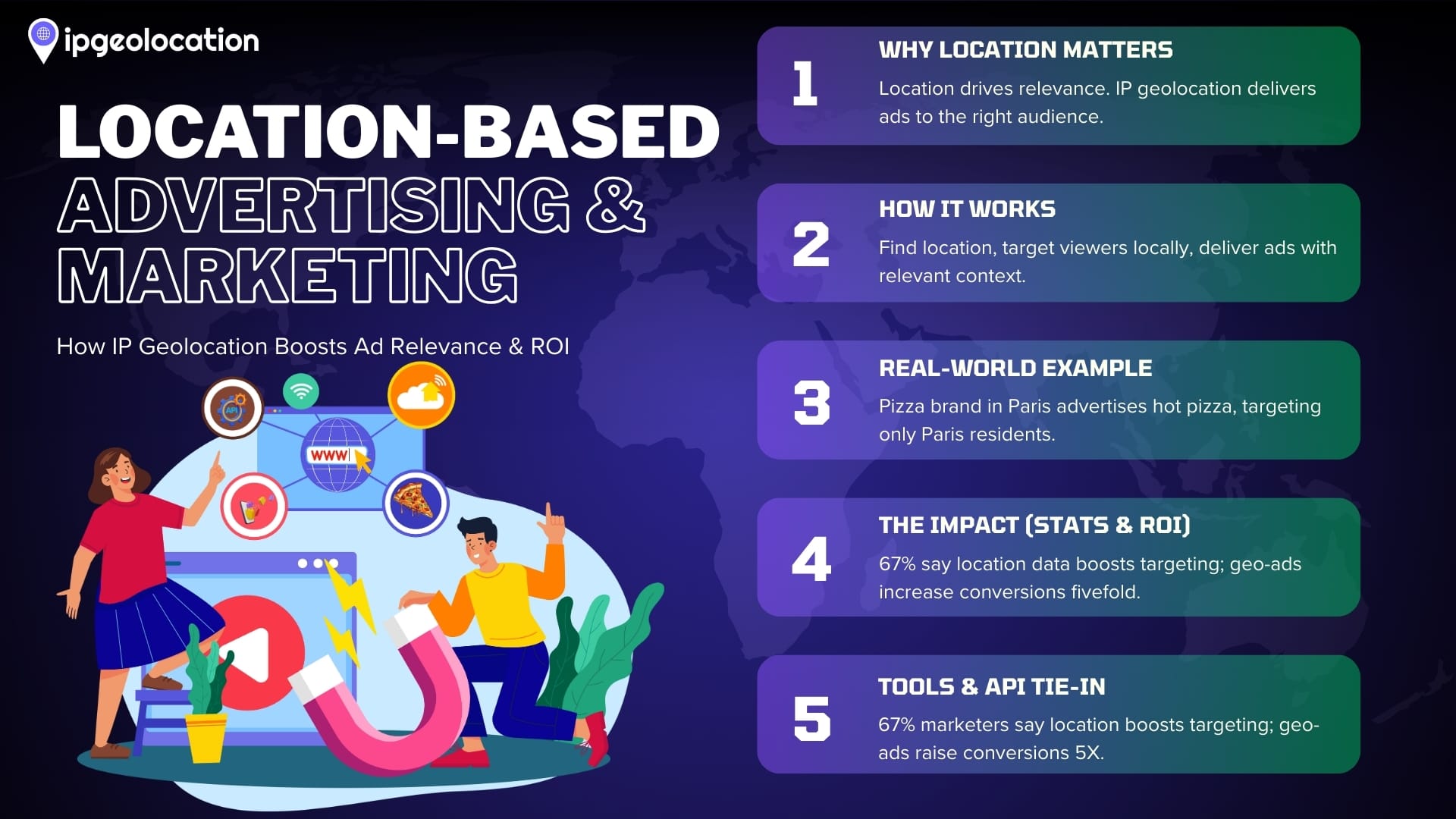
Marketers and ad tech developers can use IPGeolocation’s API for fine-grained targeting. For example, integrate ip geolocation service with your ad server or DSP to retrieve the viewer’s city and region in real time, then serve creatives specific to that region.
4 - Fraud Detection in Online Transactions
Where there is online money, there is fraud – and IP geolocation has become a critical tool in the fraud detection and risk management arsenal for banks, payment processors, and e-commerce platforms. A classic example: comparing the IP address location of a customer making a purchase to the billing address on their credit card. If there’s a huge mismatch (say, an order claiming to be from London but the IP traces to a proxy server in another country), it can be a red flag for fraud. Many fraud prevention systems use rules like "block or review transactions where the IP country is different from the billing country or far from the shipping address." In practice, services like FraudLabs Pro automatically decline orders from IPs in embargoed countries or when IP distance is suspiciously large. This helps prevent stolen card usage and chargebacks. For instance, if a fraudster in Asia is using a stolen US credit card to ship goods to themselves, the IP geolocation (Asia) won’t match the card’s home (US), triggering an alert .
IP geolocation is also used to detect impossible travel or anomalous behavior. Ever gotten a security alert saying your account was accessed from another country? That’s IP geolocation at work. Banks and social networks check if a user’s account was accessed from two countries far apart within an impossible time span. If you log in from New York and then 2 hours later from Moscow, that’s likely not legitimate. The system can then lock the account or require additional verification. Similarly, many platforms (e.g., Gmail, Facebook) will notify you of login attempts from unfamiliar locations – all powered by IP location lookup.
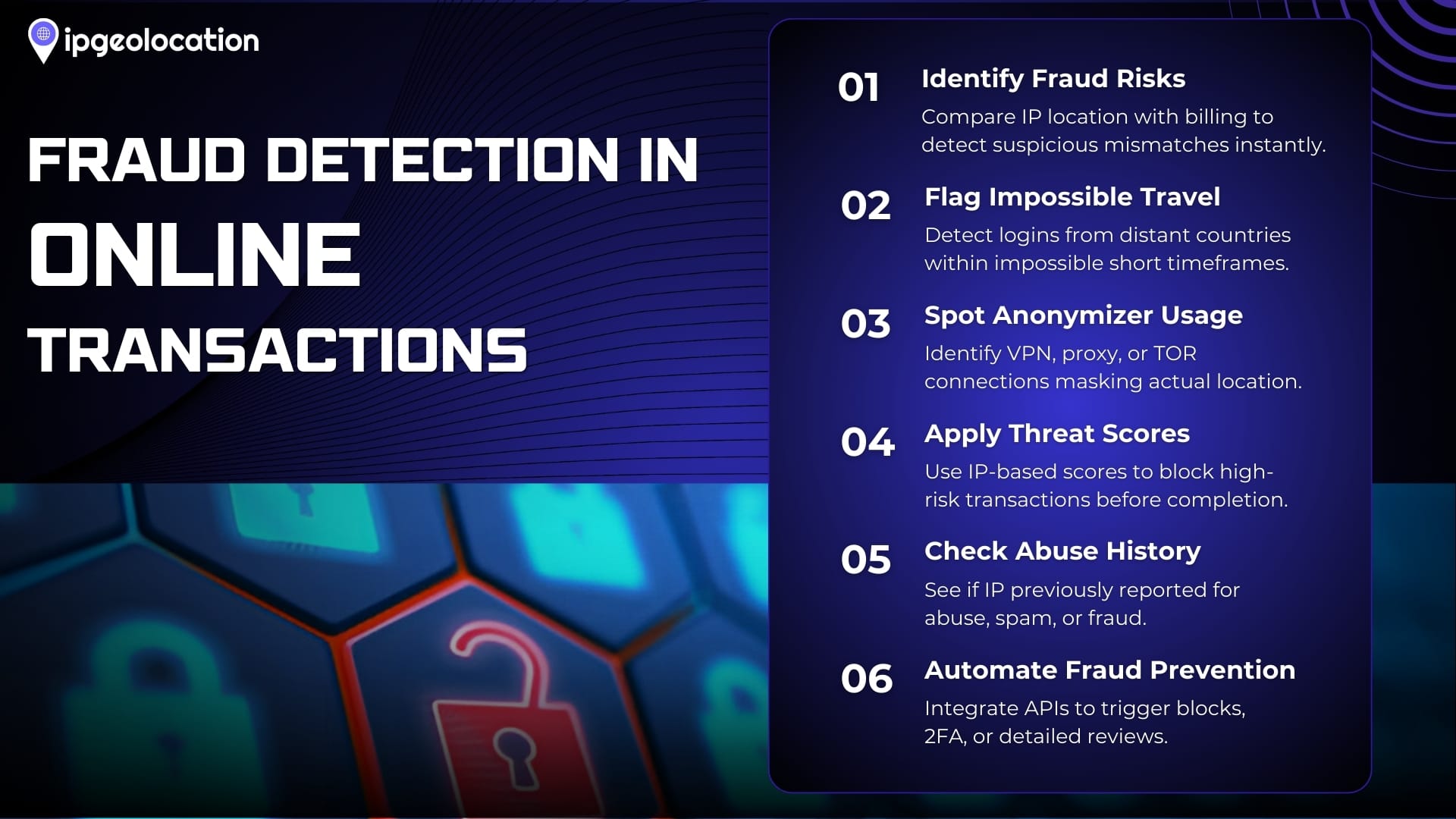
IPGeolocation.io’s Security API is ready-made solution for these scenarios. It doesn’t just pinpoint the IP’s location down to the city, it also detects whether the IP is linked to a VPN, proxy, TOR node, or has a history of suspicious activity. The VPN detection is essential, since fraudsters often use tools like VPNs or proxies to hide their true location, avoid being caught. The API’s security features return flags like is_proxy: true and even the proxy provider name, plus a threat score for the IP. A high threat score or an anonymizer flag can be used to auto-reject high-risk orders or logins. Additionally, the IP Abuse API provides abuse contact information and reports of past malicious activity for an IP, so fraud teams can see if an IP was previously reported for abuse or spam – another indicator to possibly block or challenge the user.
In 2025, stopping online fraud takes more than just checking usernames and passwords. Smart companies are now using a mix of data signals to spot suspicious activity—and IP geolocation plays a big role. Payment gateways are adding IP checks into their fraud detection systems, blocking suspicious transactions from high-risk locations. Crypto exchanges are using comprehensive geolocation data to enforce regional restrictions and flag potential fraud attempts. Even ride-sharing and ticketing apps are spotting fake bookings by identifying when multiple accounts come from the same IP or when requests come from locations that just don’t make sense. The good news? Adding these checks is easier than you think with IPGeolocation.io.
The IP Geolocation API (Advanced plan) gives you both standard location data and security insights, like coordinates and proxy detection — all in one response. If you need more focused security data, the IP Security API provides deep details like:
- Whether the IP is a VPN, proxy, or TOR node
- Is it Bot, Spam, Anonymous or Cloud provider
- A real-time threat score
Let’s say a user tries to make a transaction. Your backend can ping the IP Security API to instantly check if the IP belongs to a datacenter VPN or has a high threat score — and then decide to either block the request or trigger extra verification like 2FA.
5 - Cybersecurity & Threat Intelligence
IPGeolocation plays a major role in cybersecurity operations and threat intelligence. Modern security systems constantly ask: 'Where is this traffic coming from, and could it be malicious?' By analyzing the source and the risk factors associated with user's IP, it's possible to detect and prevent potential attacks more effectively. It analyzes the geographic distribution of DDoS attack traffic to mitigate attacks in real time . In one incident, they tracked malicious traffic coming from 112 different countries, which allowed them to isolate the worst-offending regions and protect their clients. IP geolocation data enables features like geo-blocking, where a site can outright block or present a challenge page to visitors from certain high-risk countries. Cloudflare’s tools let website owners do exactly this – if a site never expects users from a particular country, they can proactively geo-block that country to cut off a common source of attacks . This approach has become a standard defense: many web application firewalls allow geo-based rules (e.g., “block all traffic from X country”) as a quick shield during an attack or for ongoing risk reduction .
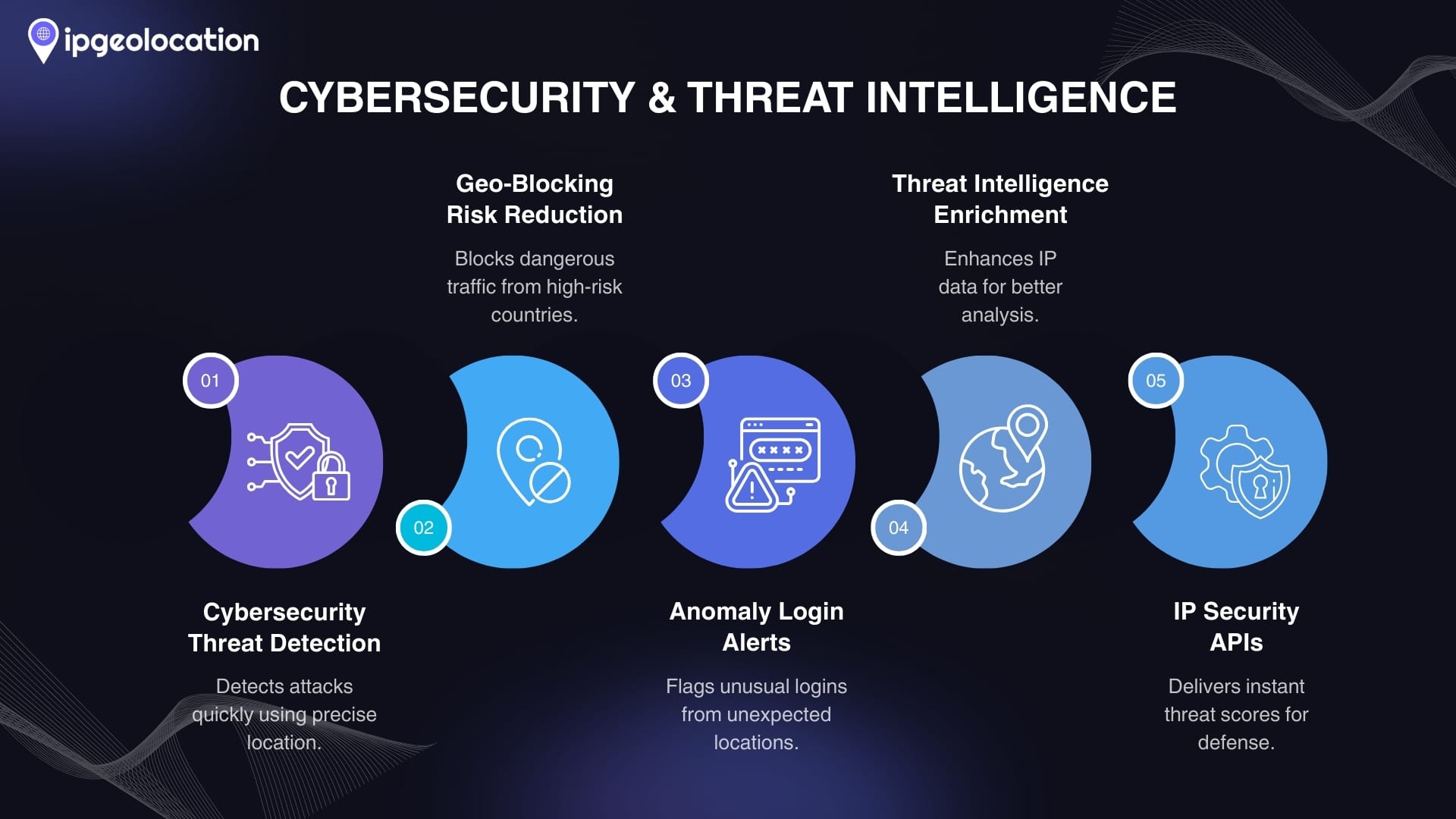
Another cybersecurity use case is account protection and anomaly detection. As mentioned earlier, if an app sees a login from a new or suspicious location, it can trigger security measures. For instance, Facebook will alert you (or prompt for verification) if your account is accessed from a country you've never logged in from before . Enterprises also use IPGeolocation to secure their systems, e.g., allowing admin access only from certain countries or flagging when an employee VPNs in from abroad unexpectedly.
Threat intelligence databases incorporate geolocation to enrich IOC (Indicators of Compromise) data. Security analysts investigating an IP (perhaps found in logs or malware traffic) will check where that IP is located, which ISP/organization owns it, and if it’s residential or a cloud server. This helps determine if an incoming connection is likely a botnet (often coming from data center IPs) or a legitimate user ISP. The ASN API and Company data from ipgeolocation can assist here by revealing the ISP or hosting provider associated with the IP company type . For example, if an IP’s ASN organization is a major cloud provider or the type is "hosting" , the traffic might be an automated cloud bot rather than a home user.
Ipgeolocation.io’s Threat Intelligence solutions include the IP Security API (for real-time checks) and IP Security Database (for offline use), which identify known attackers, bots, VPNs and give a threat score. The data is constantly updated, processing terabytes to extract insights . Combined with the IP Abuse Contact API/DB, security teams can not only detect a hostile IP but also retrieve the right contact to report abuse (useful for stopping persistent attacks by contacting the ISP) .
For cybersecurity needs, use IPGeolocation’s IP Security API to get a quick read on an IP’s threat level – for example, it can tell you if an IP is known for spam or is part of a cloud provider network (common for bots) . This API is perfect to integrate into firewalls, SIEM systems, or custom threat dashboards. Additionally, the ASN API provides network context (ASN number, ISP name, IP range, respective peers, upstreams and downstreams) which is valuable for threat research and network defense . Together, these tools enable geolocation-based security policies: e.g., automatically block high-threat-score IPs or apply stricter rules for traffic from countries where you don’t do business .
6 - Regulatory Compliance & Geo-Blocking (Legal Restrictions)
In 2025, compliance with regional laws and licensing agreements is the top priority for online businesses. And IPGeolocation is the key that makes it possible to enforce those rules on the fly. One major aspect is digital rights management and content licensing. Services like Netflix and other streaming platforms must restrict content based on where the user's physical location is. And this is mainly due to complex licensing deals and censorship laws. When you log into Netflix, the service checks your IP’s location and then shows you only the movies/series permitted in your country . If a title isn’t licensed for your region, it won’t even appear in your catalog. This geolocation-based filtering keeps Netflix compliant with distribution rights while also avoiding a negative user experience (you won’t see a show you can’t actually play) . Similarly, sports streaming sites, online casinos, and music platforms use IP blocking to enforce regional restrictions – for example, an online sportsbook will block users from states or countries where online betting is illegal. IP geolocation essentially acts as a digital gatekeeper ensuring that only allowed regions can access certain content or features.
Another compliance angle is export controls and sanctions. Companies must avoid doing business with embargoed countries or certain IP ranges. E-commerce and SaaS providers use IP geolocation to detect if a user is from a sanctioned country and then block the transaction or show a message that the service isn’t available there. FraudLabs Pro, for instance, has a feature to auto-block orders if the IP’s country is on the U.S. embargo list .
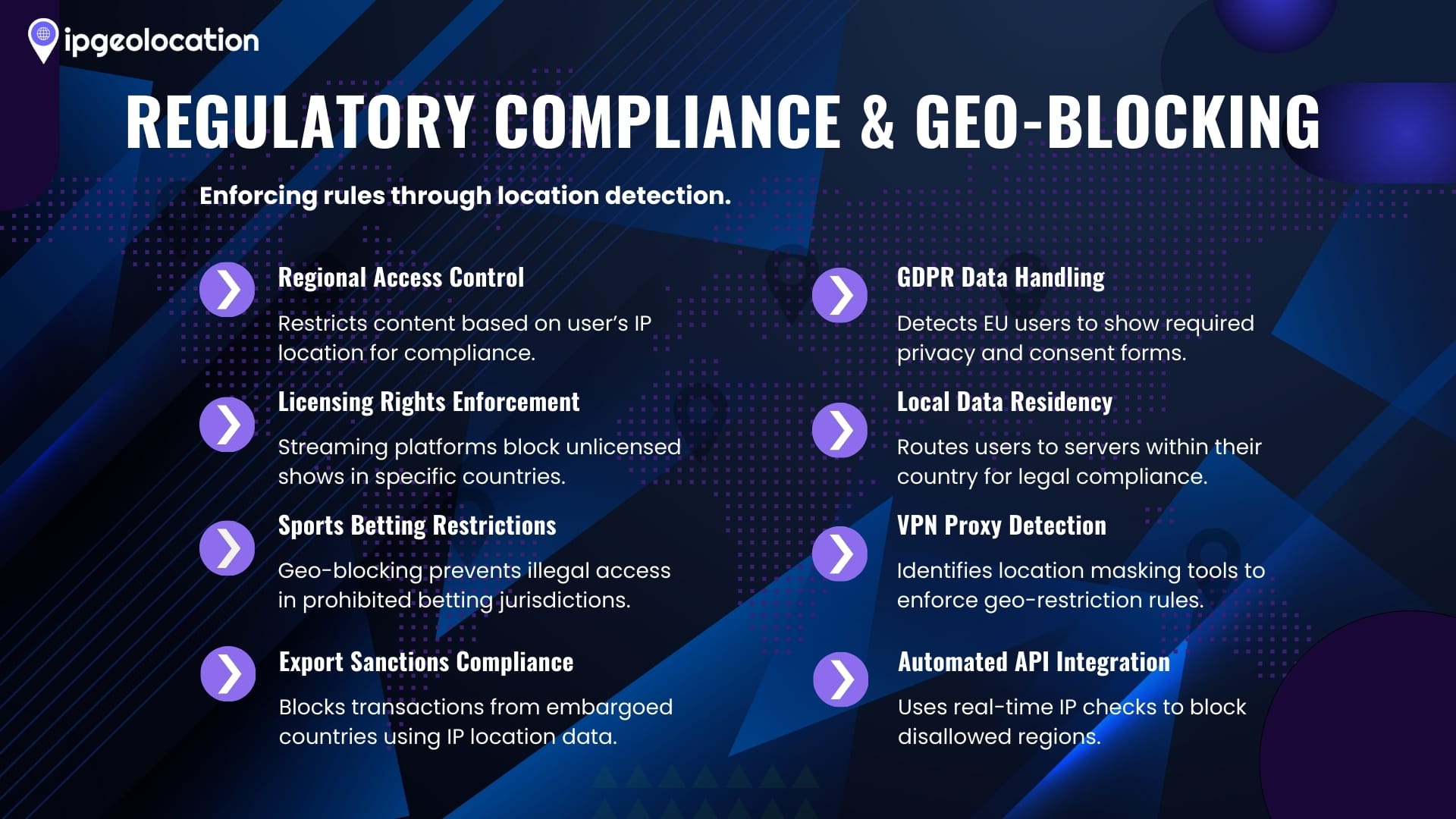
Data privacy laws also come into play. Regulations like GDPR in Europe require special handling of EU user data (e.g., showing cookie consent forms, or routing data to EU servers). By identifying an EU user via IP, a website can automatically present a GDPR consent banner or enforce that the user’s data stays on EU-based infrastructure . Some SaaS companies use IP geolocation to implement "data residency," e.g., if an IP is from Australia, route them to an Australian data center to comply with local data laws or simply to reduce latency.
7 - SaaS Access Control and Account Security
For SaaS and B2B services, IPGeolocation offers a way to control access and protect accounts based on location criteria. Companies often have legitimate reasons to allow or disallow logins from certain regions. For example, an enterprise might restrict its internal SaaS tools so they can only be accessed from countries where the company has offices, let say, as a security measure. Using IP geolocation, the SaaS can enforce that policy by blocking login attempts coming from outside those countries (or outside a corporate VPN range) . This reduces the attack surface by preventing credential abuse from unexpected places. Many business applications let admins configure allowed IP country lists or notify them of new country logins – all driven by accurate geographical location data.
Another angle is account anomaly detection for user security. Suppose, if some user's account suddenly starts a session from an atypical location (especially a high-risk country), the service can step up authentication. For instance, SaaS platforms may require email verification or two-factor authentication if an IP is in a different country from the user's usual profile. This is similar to how banks treat credit card usage abroad as higher risk. IP data provides "where" context which adds a layer of defense beyond just password checking .
SaaS companies also use geolocation for performance optimization – routing users to the nearest servers (via Geo-DNS or load balancers) and showing service status in local time zones. While this is more about performance (we'll cover it next), it intersects with access control: e.g., directing a user to a region-specific authentication server.
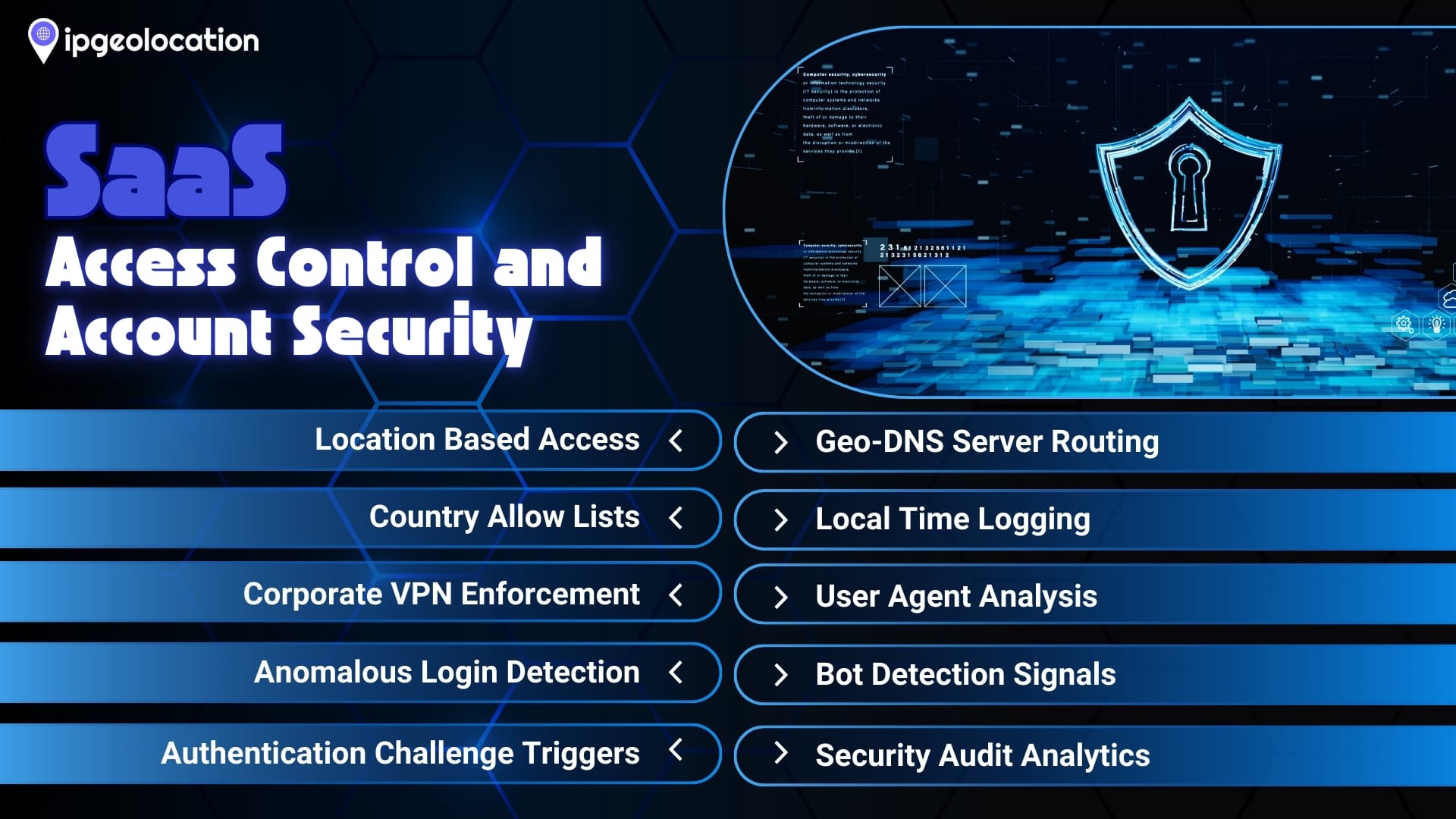
Ipgeolocation.io’s services can enhance SaaS platforms easily. The IP Geolocation API gives the needed location info (country, region, city) to make access decisions. The Time Zone API can return the user’s local time and GMT offset , which can be used to timestamp logs in the user’s local time or to schedule maintenance windows when it’s off-hours for the user. Meanwhile, the User Agent API complements IP data by identifying the client device and detecting bots or outdated clients . A combination of IP geolocation + user agent analysis can detect suspicious scenarios (e.g., a login from a data center IP with a headless browser user agent might indicate a bot attack).
If you run a SaaS or online platform, consider using IPGeolocation’s API to enforce location- based access rules. For example, on each login request, use the API to fetch the country and cross-check it with the user’s allowed locations or past login history. If something looks off (new country, or a known anonymous proxy per the Security API), you can ask for an extra OTP code or send an alert. The User Agent Parser API can further identify if the client is a known bot or crawler (it can flag common bots by parsing the UA string), which helps in blocking automated attempts.
8 - B2B Intelligence and IP-to-Company Mapping
Not all IP geolocation use cases are about end-user experience or security – some are about sales and business intelligence. A powerful but sometimes under-used application in 2025 is leveraging IP data to identify the company or organization behind a visitor, which is gold for B2B marketing and account-based sales. When someone from a large company visits your website, their IP addresses often resolves to that company’s network. With the right data, you can determine “Hey, this visitor is from Acme Corp in California.” This is done via IP-to-company lookup, which maps IP ranges to organizations. Knowing the visitor’s company means your marketing or sales team can treat it as a potential lead – for example, if someone from Google LLC visited your pricing page, that’s valuable insight to follow up on.
IPGeolocation.io offers an IP to Company Database aimed at this use case. It can reveal the company name, domain, and type associated with an IP address . For instance, an IP belonging to a cloud provider might show company as "Amazon AWS" with its type as hosting, whereas an IP from a business might show "Acme Inc" (type: business) along with the company's website. IP to Company data enables Account-Based Marketing (ABM) tactics i.e., your site could dynamically display a personalized banner like "Welcome Acme Inc! See how our solution fits your industry," which is sure to catch the visitor's attention. It can also trigger alerts: "A Fortune 500 from USA visited the site today," prompting sales outreach.
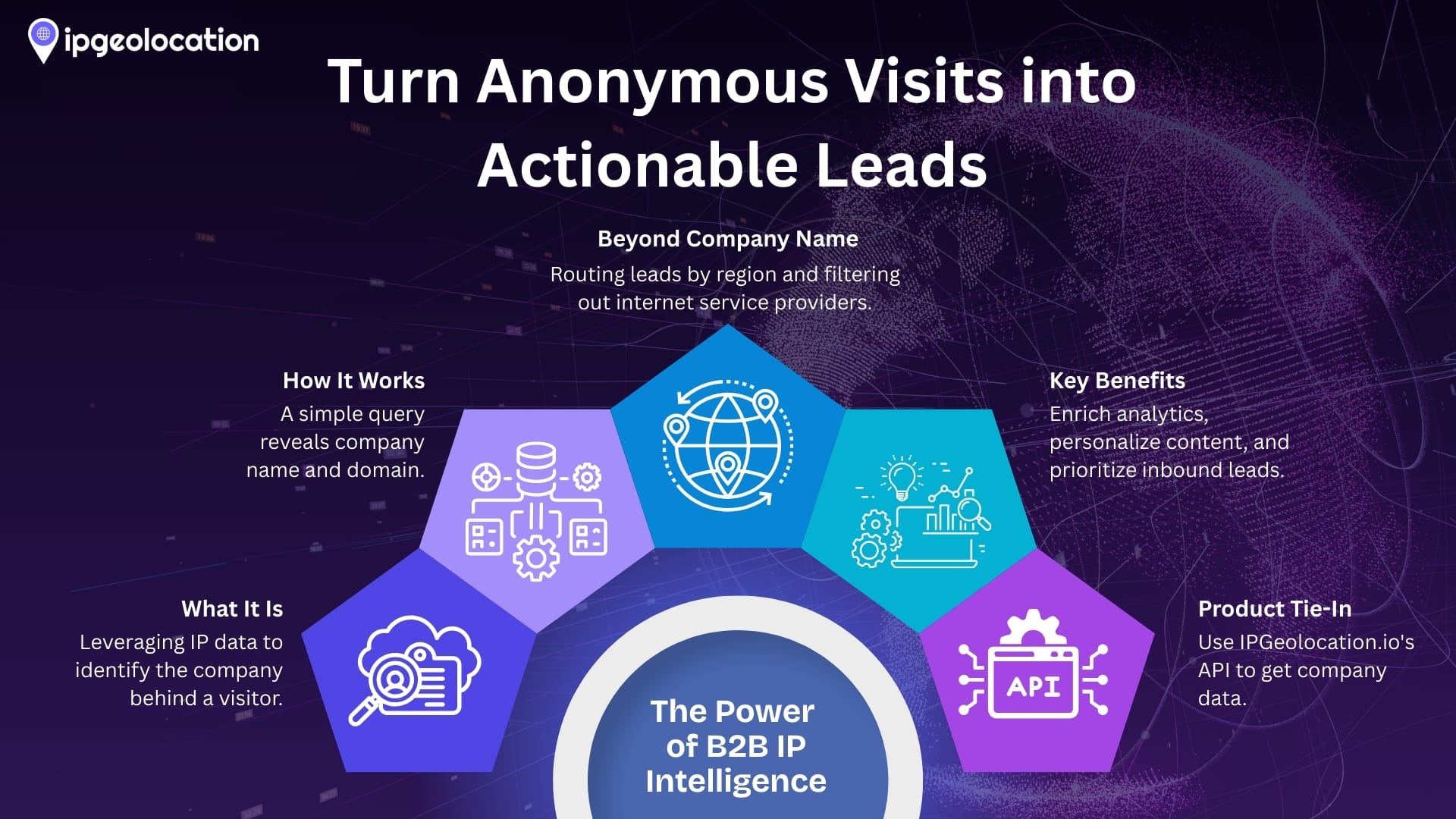
Another use is enriching analytics and CRM records. By adding company and industry information to your web traffic data, you help your marketing team prioritize inbound interest. Some companies integrate IP-to-company data into tools like HubSpot or Google Analytics, effectively de-anonymizing a portion of their web traffic into identifiable business visitors.
Geolocation still plays a role here beyond just the company name. For example, if you identify the company, you also get the office location (country/region) from the IP data – useful for routing the lead to the appropriate regional sales team. Additionally, combining ASN data can help differentiate ISPs vs enterprises (so you don’t mistake an ISP like "Comcast” for a company lead – the data will show it’s an ISP).
Ipgeolocation.io’s ASN API provides details on the network owner which can assist in this filtering. Product tie-in: To leverage this, use IPGeolocation’s IP to Company API or the IP Geolocation API (which includes company info in the network object) . With a simple query, you’ll get fields like company name and company domain for the IP, telling you if the user is coming from a business environment. For example, many B2B SaaS embed this in their signup forms or analytics – when someone signs up, they capture the IP and instantly know the company to personalize the onboarding (“We already help many colleagues at [Company]!”). The the is also available for offline processing, letting you scan through logs of IPs to extract a list of companies that visited your site. In short, IP intelligence can turn anonymous visits into actionable leads, giving your B2B outreach a significant edge .
9 - User Experience Enhancements (Autofill & Timezone Adaptation)
IP geolocation can also be used to streamline user experience (UX) in subtle but important ways. A prime example is autofilling user inputs based on IP-derived location. Many registration or checkout forms ask for information like country, state, or ZIP code. By using the visitor’s IP, you can pre-select or suggest these values, making forms faster and less tedious to complete. For instance, if an IP lookup tells you the user is in "New York, USA," your form can automatically set the country to the United States and even prefill the city or postal code field (with the option for the user to adjust if needed). This reduces friction and can improve conversion on sign-ups and checkouts. Ipgeolocation’s service specifically highlights this use: you can autocomplete fields like city, state, country, ZIP code, dialing code, and even the local currency on your forms using their APIs . It’s a small touch that can significantly boost form completion rates.
One useful UX approach is showing people the right time and context based on where they are. For instance, If your app or site deals with scheduling, events, or anything time-sensitive — knowing the user's time zone makes a big difference. Instead of showing a fixed time, you can automatically adjust it to their location. For example, a webinar signup page might say: "This event starts at 3:00 PM your time" after detecting the user’s zone. A dashboard could also greet someone with "Good morning" or "Good evening" depending on the hour . Services like the Timezone API from ipgeolocation can provide the exact local time, UTC offset, and even daylight savings details from an IP or set of coordinates, and many more such tz fields. That means apps can display timestamps correctly or send notifications at hours that actually make sense for the person using them. Even simple touches like showing today's weather or the current time in the user's city can make the experience feel smooth, natural, and welcoming — it simply ensures visitors feel at home.
We can also include Astronomy data under UX enhancements. Ipgeolocation’s Astronomy API provides sunrise and sunset times (and even moonrise/moonset) for any location. Developers use this in creative ways, like automatically switching an app's theme to dark mode after sunset in the user's region, or a smart home app timing lights with local sunrise. In 2025, with increasing interest in wellness and automation, apps might use sunrise/sunset info to, say, schedule when to send morning notifications or to adjust content (imagine a fitness app that says "It’s daylight now – perfect time for an outdoor run!" based on your location’s sunrise). By plugging IP-derived coordinates into an astronomy API, you get these environmental context cues effortlessly.
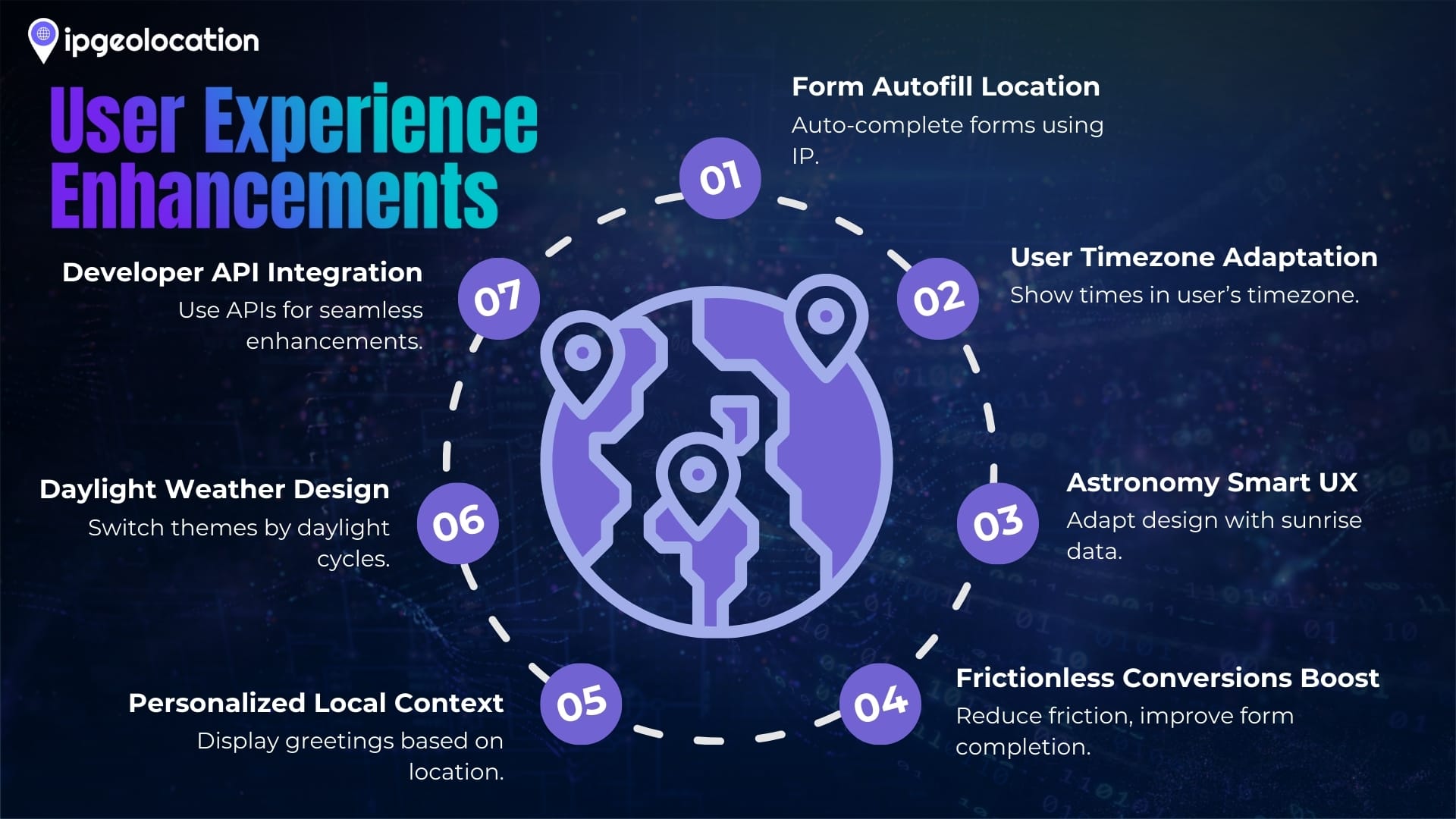
Front-end developers and product designers can use IPGeolocation.io’s Timezone API to instantly retrieve a user’s local time zone and current time . This can feed into any feature involving time displays or scheduling. Meanwhile, using the main IP Geolocation API, you can get granular location data to auto-fill form fields (country, city, ZIP) and even customize content like showing the user’s country flag emoji or calling code. Implementing this might be as simple as calling the API on page load and then using JavaScript to fill in form values. Additionally, try the Astronomy API for sunrise/sunset - for example : Travel website can display how many hours of daylight are left at the user’s location today, adding a nice personal touch. These little UX improvements can delight users and set your site apart.
10 - Network Optimization & CDN Routing
Last but not least, IP geolocation is fundamental for network performance optimization. The internet may be global, but speed and reliability often depend on serving users from infrastructure that is geographically close to them. That’s why Content Delivery Networks (CDNs) and many cloud services use IP geolocation to route requests to the nearest server location. When you access a website or app, a geo-IP lookup can determine that you’re, say, on the West Coast of the US, and then connect you to the West Coast data center for faster loading, rather than a server in Europe. This is often done via DNS or load balancers that incorporate geolocation (sometimes called geo-DNS). The result is reduced latency, faster content load times, and a better user experience. As IP2Location notes, CDNs use your IP’s geolocation to find the nearest server, so you "wait less and surf more" . In 2025, with ever larger media and more interactive applications, this optimization is crucial.
The IP Geolocation Databases are particularly useful for high speed lookups needed in routing decisions. It can be integrated with DNS servers or application logic to do bulk lookups with minimal latency. The city-level data accuracy with accuracy radius means you can direct users with fine granularity if needed (for example, east vs west coast in the US). Additionally, the API or DB includes the ASN and carrier details, which can help identify if multiple users affected by slowness are all coming via the same ISP or mobile carrier. This might hint at an external network issue rather than your servers.
In edge computing scenarios, devices or apps might use IP geolocation to choose an optimal server themselves. For example, a smart client could ping ipgeolocation’s API to get its own location, then use that info to call the nearest service endpoint (among a list of known endpoints around the world).
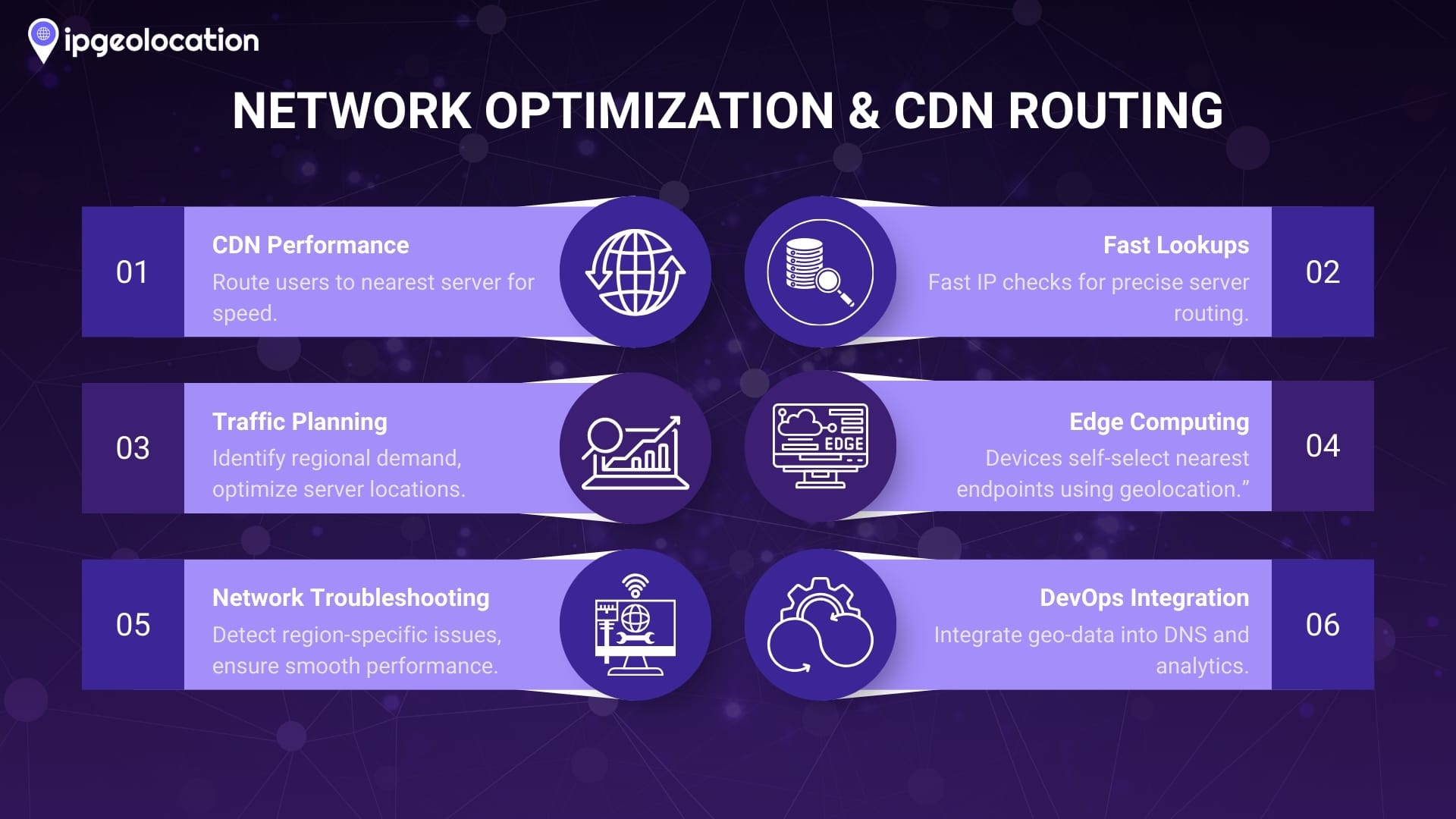
For devops and network engineers, IPGeolocation’s IP data can be integrated into your traffic routing and monitoring. The GeoIP databases (downloadable) can be used with DNS services to implement geographic load balancing – your DNS server looks up the user’s IP in the DB and returns a region-specific server IP. If managing infrastructure isn’t your focus, you can also use managed CDNs or cloud load balancers and import accurate geolocation data into analytics. The ASN database could help in tailoring network policies per ISP, and the IP Geolocation API is always there for quick, real-time lookups or debugging. In short, IP geolocation ensures your users are served from the best possible location, improving speed and reliability automatically .
Conclusion
From enhancing the user personalization to fortifying security, the use cases for IP geolocation are remarkably diverse and impactful for businesses and developers in current era. Industries such as e-commerce, digital advertising, finance, SaaS, gaming, media, and many more businesses rely on knowing "where users come from". Location data from IP addresses can enhance conversions , personalize experiences , prevent frauds, ensure compliance, and optimize operations in real-time. Thanks to the ipgeolocation.io service, these capabilities are no longer limited to techs with giant networks only. Developers can access advanced IP intelligence through simple APIs or bulk Databases, whether for real-time lookups or large-scale enrichment. A single API call can return location , ISP/ASN , company data , timezone , and even security risk scores – hence giving a 360-degree view of each IP. This makes enterprise-grade features like personalization and threat blocking achievable for startups and enterprises alike.
Take the Next Step: If you’re ready to implement any of these use cases, you can try out ipgeolocation.io’s APIs for free and see the data in action. From a developer-friendly IP Geolocation APIs to complete complex IP intelligence databases, you have the tools to make your application location-aware in no time.
Subscribe Our Newsletter
Get the latest in geolocation tech, straight to your inbox.
Start for
Free
No Credit Card Needed
Access up to 1,000 requests/day with our forever free plan.
Sign Up Free




